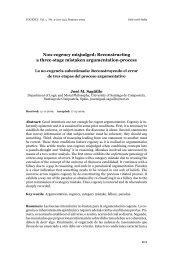Cogency v2 n2
Cogency v2 n2
Cogency v2 n2
Create successful ePaper yourself
Turn your PDF publications into a flip-book with our unique Google optimized e-Paper software.
Lawrence S. Cunningham (Ed.), Intractable Disputes about... / C. HAYES<br />
three types: goods relevant to our physical nature (life, health), our animal<br />
nature (sex, caring for children) and our rational nature (knowledge and<br />
social goods). He makes a distinction to explain why there are apparently<br />
intractable moral disputes and why such disputes do not refute natural law<br />
claims. This distinction is between the primary and secondary precepts of<br />
natural law.<br />
MacIntyre makes two points concerning primary precepts. They should<br />
not be identified, or confused with, the first principles of natural law (such<br />
as the example above: “good is to be done and evil…avoided”). Like first<br />
principles, they are known non-inferentially. Secondary precepts are those<br />
that help us apply primary precepts to concrete situations. If we agree that<br />
promoting peace, mitigating or eliminating poverty, racism, sexism and diseases<br />
from the human race are morally virtuous, we still face questions of<br />
how best to achieve these goals. This permits, in fact requires, that we reject<br />
relativism at the level of primary precepts but recognize its necessity at the<br />
secondary level. Primary precepts remain the same in every society, but the<br />
forms through which they receive expression do not, and in this sense they<br />
can be called “relative” to a society’s needs, resources and its citizens’ abilities.<br />
MacIntyre recognizes, as did Aquinas, that not all humans acknowledge<br />
the rational cogency of natural law. For Aquinas this is due to mental defects<br />
or disorders in some persons, and in others it is due to selfishness,<br />
passion, and bad habits or dispositions. These, however, are rare exceptions.<br />
So it would seem that agreement with natural law should be widespread<br />
with dissent from it being exceptional. MacIntyre says that facts concerning<br />
moral disagreement do not bear out this explanation. He then proceeds<br />
to the major types of moral disagreement in the early 21 st century.<br />
He defines five types of such seemingly intractable moral disagreements:<br />
the inviolability of innocent human life; the relationship of ends and means;<br />
human sexuality; honour and loyalty; and Social Justice. He concludes this<br />
survey of intractable disputes with a key meta-theoretical point: the contending<br />
parties in these disputes appeal to first principles that provide them<br />
with justification for their moral claims concerning taking of human life,<br />
sexuality and economic justice. Then, however, rational argument gives way<br />
to “shrill assertion and counterassertion of incompatible first principles”<br />
(p. 11). This leads to one of his most frequently asserted principles, the need<br />
137








